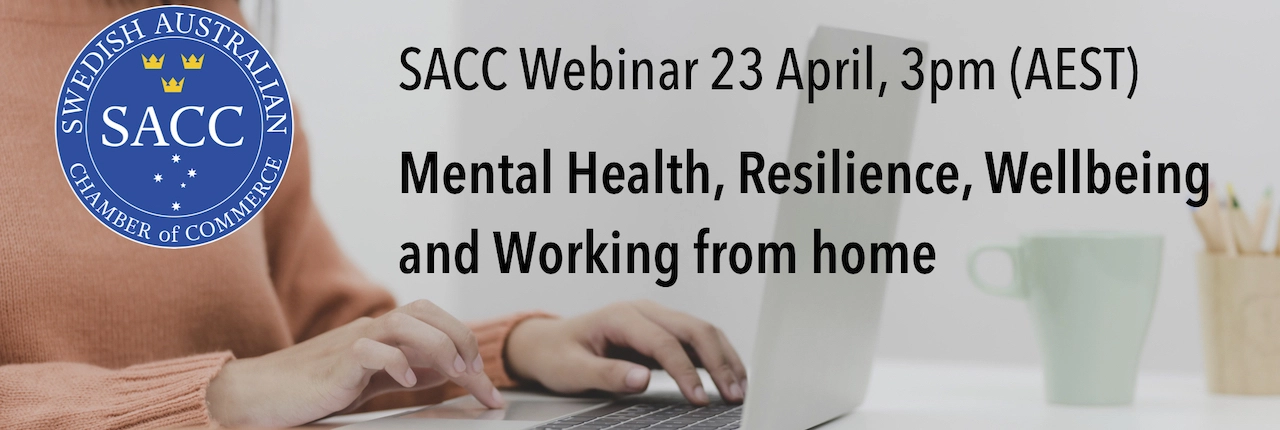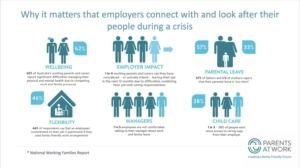Summary
The Swedish Australian Chamber of Commerce organised a webinar on Mental Health, Resilience, Wellbeing and Working from home on Thursday 23 April.
In the webinar we covered questions like:
How employers and employees manage and react to this situation that has disrupted our lives so swiftly?
What support mechanisms have been put in place for working remotely, specifically from a health and wellbeing perspective?
What are the main challenges we are facing now?
Challenges with remote working?
Why is it so important that employers connect with and look after their people now?
How can employers help?
Expectations and guidelines for working from home?
Useful tips and resources for employers and employees?
We listened to our panel of experts sharing their insights on helping individuals, families and organisations getting through these tough times:
Michael Kim, Head of HR JAPAC, Spotify
Emma Walsh, CEO, Parents At Work
Emma Crichton, Executive Director, PeoplePlus
And Rick Jansz from the SACC Melbourne Chapter Board, who was the moderator for this webinar.
 Michael Kim, Head of HR JAPAC, Spotify
Michael Kim, Head of HR JAPAC, Spotify
Since the early stages of the COVID-19 pandemic, Spotify have been identifying ways to help and support their people. The safety of their people comes first. Back in early January they first introduced the working from home option for their employees in Singapore and Japan. Their employees had the power and the ownership to make this decision themselves, you didn’t need your manager’s approval to work from home.
“We over-communicated during this time, we leveraged not only platforms such as email but also workplace or whatever medium companies use to connect via the internet. We gave them daily and weekly updates. And something which was also very powerful was acknowledging and admitting that we don’t know all the answers to this and will get back to them. This created a sense of trust, a sense of unity, and a culture of safety. Making people feel, hey we have your back, we were open and vulnerable.” The management spoke about really uncomfortable topics between the Chief Human Resources Officer, Katarina Berg, CEO Daniel Ek and Michael Kim sending out emails and having one on one sessions about bereavement, death, depression, mourning, and isolation. They recognised that vulnerability is not a weakness it is a strength and people really reassimilated with that.
“Communication and to stay connected with our people during this crisis have been our key to success.” From the Spotify CEO’s perspective usually, Daniel Ek does and all hands every quarter, he has now started doing it every week giving the fact that everyone is working from home and understanding that they need to stay connected with their people.
They addressed parents acknowledging that it is difficult for them to work from home with the school lockdowns and went out with the message that it is ok to work in an environment that is a bit chaotic with kids and pets in the background. This is unprecedented times get used it, it is ok for you to work in that environment. Spotify reminded their staff that they have paid time off and vacation days and encourage staff to take a break if they needed it.
Furthermore, they offered meditation and headspace subscriptions. “The most important thing we have offered during this crisis as an employer is to give our people the autonomy and empowerment for them to control their schedule, their time, and of how they want to work. And we as employers will support them to 100%.”\
Spotify also organise fun creative virtual communication with their people, through organising a pet conference, virtual DJ sessions, the leadership team started a lemon challenge to eat two lemons under a certain amount of time.
There were also a few tactical actions taken, for example, they understood that their people’s homes are not an office environment, so they quickly worked with finance to create a budget and allowed their people to expense office supply.
Michael summarised what is getting them through this pandemic. The first point was that the pandemic is actually creating a stronger culture and bond amongst people. In times of crisis, people come together. The second point was the way they communicated and over-communicated with their people instead of keeping them in the dark had proven to be the most affected strategy during this pandemic.
Michael’s final advice was: “Over-communicate, constantly let your people know that you are looking out for them and that you are thinking about them. Let them know this is what we are working on to keep you as safe as possible. This has eliminated a lot of fear and anxiety and has proven well for us at Spotify.”
Emma Walsh, CEO, Parents At Work
 “Parents at work – that is what we are about supporting families and it has been really challenging times for our business having to readjust to that there are so many families in need support right now. What are we going to do to support them, because if we can’t rise now as a business and be there for families to support them, then why would we exist? This is our opportunity for us to really think of what we do to support.”
“Parents at work – that is what we are about supporting families and it has been really challenging times for our business having to readjust to that there are so many families in need support right now. What are we going to do to support them, because if we can’t rise now as a business and be there for families to support them, then why would we exist? This is our opportunity for us to really think of what we do to support.”
Emma showed slide below, listing the challenges families are facing today.
“Normally it is only one or two of these challenges we are working with but now all these challenges are happening at once, and if you throw these challenges on employers, employees and families at once it is incredibly overwhelming.”
Emma especially brought up the effect of the isolation which means that people are missing their social hood and support network that families can’t be in touch with now. It becomes very fragile without this support and makes it even more difficult to cope and operate effectively. She also highlighted these challenges need to be acknowledged by employers.
“The particular challenge for employers and for all of us is that we don’t know when this is going to be over and when we get to the other side of this pandemic what is it going to look like? What kind of flexibility will be needed? These are questions we ask ourselves every day and at the same time, we are worried about if we are going to be able to keep our jobs. These challenges hitting us all at once are unique and require a unique response.”
Furthermore, Emma brought up the positives of remote working such as:
- Flexible schedule
- More time with family
- No office distractions
- Zero commuting and comfy clothes
- Save money, exercise more and appreciate the back to basic things
- Easier to get household chores done around work
- Chance to customise your work environment
Many organisations have been holding back allowing their people working from home with more flexibility and more irregular hours and there will most certainly be some significant changes working remotely in the future. Emma mentioned that there is a balance of the negatives and positives in remote working today but there can certainly be more positives with remote working if we can get it right, communication is key.
Why it matters that employers connect with and look after their people during a crisis?
Parents at Work conducted a survey at the end of last year with over 6000 working families and asked them how they were managing as a working family. “The feedback they gave us was that they were not managing very well. 62% said that they struggled with their own personal health and wellbeing, 1 in 4 were thinking about leaving their current employer because of the conflict and that managers haven’t given them the flexibility they needed. And this is before the crisis, can you imagine how people are feeling now? More organisations need to have a response on how to manage workers from home.”
To sum up a few points of how employers can help, Emma recommended the following:
- Invest in training leaders on remote working
- Check on people’s emotional and financial wellbeing
- Provide coaching or counselling support to look after their mental, physical wellbeing
- Don’t overdo online meetings or calls!
- Be real and encouraging – acknowledge that employees are doing the best they can
Emma Crichton, Executive Director, PeoplePlus
PeoplePlus is a public service provider, supporting thousands of people each year. They strive to empower people, communities, and nations to be effective and productive. They do this by running a range of frontline public services covering employment support, training and education, justice, business start-up services, and health and wellbeing.
 One of the questions we asked Emma was: PeoplePlus work with up to 12,000 jobseekers at present, how they go about ensuring their wellbeing and resilience in these current conditions? They don’t phone a jobseeker and ask them how they are going … they aren’t doing good and you have started your conversation in the negative… Instead, they use behavioural economics, a strengths approach is used as the framework for every conversation. For example: “Name one good thing that’s happened since we last spoke?” or “Thanks for taking the call.” “You’ve got a great phone voice! Now, let’s look at your action plan.”
One of the questions we asked Emma was: PeoplePlus work with up to 12,000 jobseekers at present, how they go about ensuring their wellbeing and resilience in these current conditions? They don’t phone a jobseeker and ask them how they are going … they aren’t doing good and you have started your conversation in the negative… Instead, they use behavioural economics, a strengths approach is used as the framework for every conversation. For example: “Name one good thing that’s happened since we last spoke?” or “Thanks for taking the call.” “You’ve got a great phone voice! Now, let’s look at your action plan.”
Another question was: We are currently seeing short term crisis responses – what are the longer-term occupational strategies that you are implementing? We are realising what we need to do and what we already needed to do before such as:
- Stand up meetings
- Comedy or musical gigs
- Cross divisional teams and task forces for deeper collaboration
- More reliance on the cloud
“When we are in a pandemic we have to be on the cloud, we have to collaborate and work better in cross-divisional teams. Often people retreat back to their tribe and their comfort zone when they are working in the office but when you are working in the cloud as during this pandemic we are less likely to retreat and instead finding new efficiencies, innovations, collaboration and finding better practices of working with people that we normally don’t work with. We have to be innovative, creative, and financially responsible, and in everything we do in a crisis, let’s be sure we practice kindness.”
Emma.Crichton@peopleplusaustralia.com.au
By Camilla Jennings, Business and Events Manager SACC
View the full video recording of this webinar here: https://www.youtube.com/watch?v=xe4ne3lBt9U&t=1180s
Contact us if you would like more information: sacc@swedishchamber.com.au
For event updates and information visit www.swedishchamber.com.au and follow us on Facebook I Linkedin I Twitter




